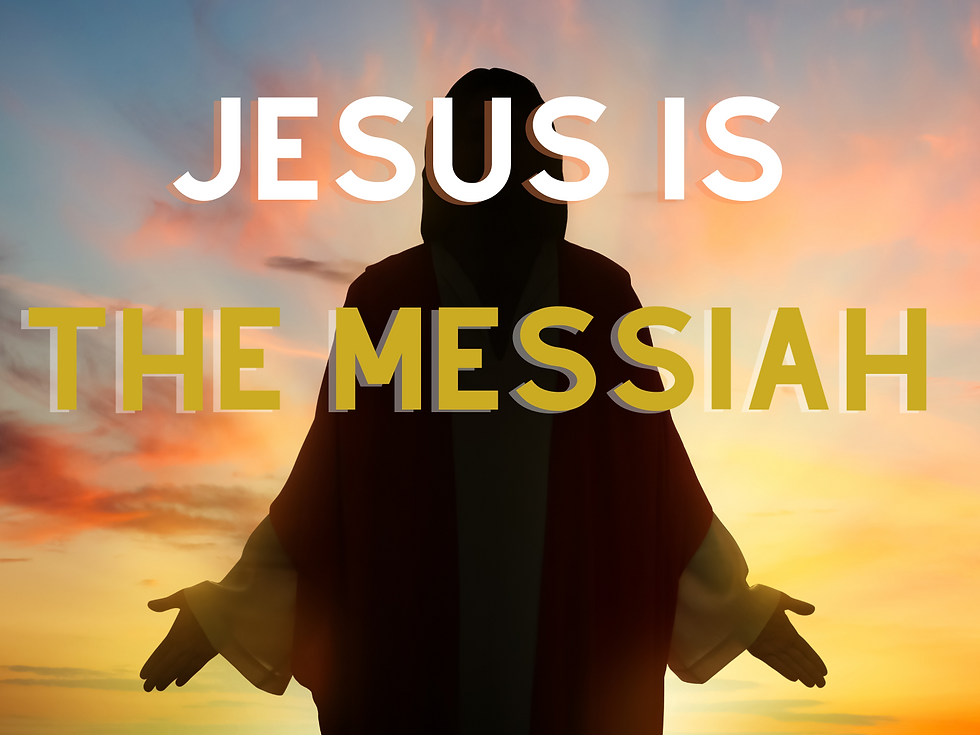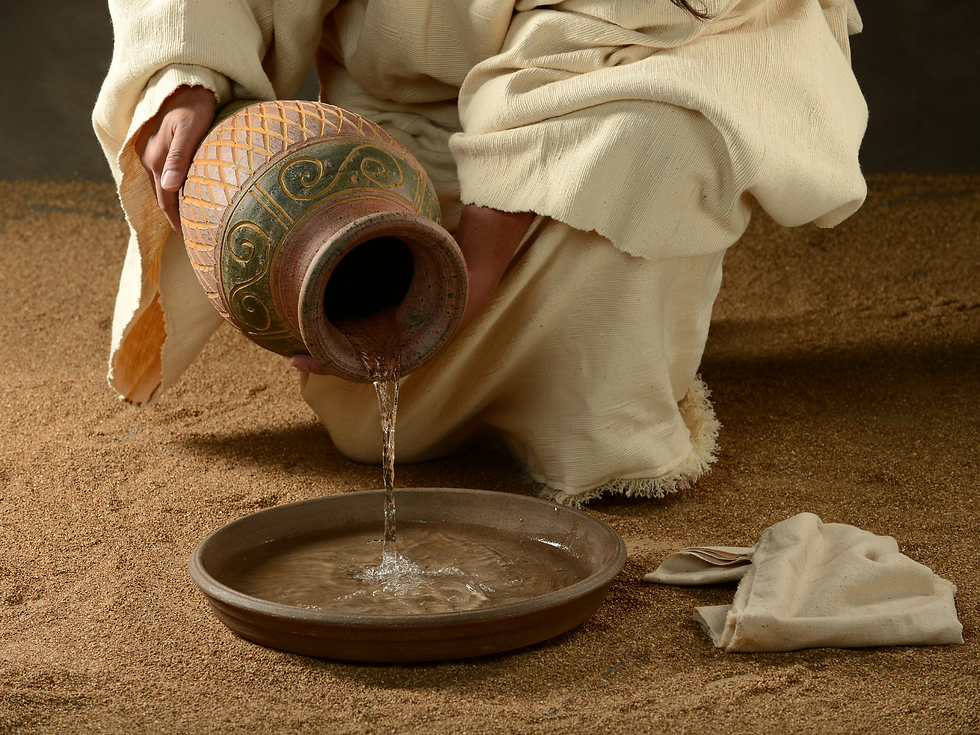
Messiah: The promised savior and deliverer, foretold in the Old Testament scriptures, who is believed to be the anointed one of God, sent to redeem and save humanity from sin and bring about God's kingdom on earth.
“Simon Peter answered, “You are the Messiah, the Son of the living God.”” (Matthew 16:16, CSB)
When we think about the good news of the kingdom of God we must, even early on, consider the Messiah. Every kingdom has a king. This king, this Messiah, according to the Scriptures is the one who will bring the manifestation of the kingdom of God on this earth.
Jesus is the Messiah is the fourth of the nine essentials of the Gospel of the Kingdom of God.
The big question to consider is Jesus of Nazareth the Messiah and how would we know?
There are actually a lot of reasons for believing that Jesus of Nazareth was and is the Messiah. In fact, I can’t think of another person in history who would match up to the qualifications that Jesus brings to the table.
You may ask, “Well, what are some good reasons for believing that anyone, let alone, Jesus of Nazareth is the Messiah?” It’s a good question. I’ll list eight reasons, then I’ll look more in depth at three of them. Here are the eight.
Fulfillment of the Messianic prophecies from the Hebrew Scriptures.
Miracles performed by Him.
His life and teachings.
His claim and demonstration of authority.
His death and resurrection.
The transformation of His followers.
The birth and growth of the early church.
The continuing impact of personal meaning, purpose and transformation of individuals throughout history to today.
There could be more listed, but I believe that I’ve covered the big ones. Now let’s move from the eight to what I call the big three.

The first of the big three is also number one in the above list: Fulfillment of the Messianic prophecies from the Hebrew Scriptures. The Hebrew Bible (Tanakh) for over one thousand years specifically promised a coming Messiah. These Scriptures spoke of the Messiah’s lineage, his substitutionary suffering, and the occasion and place of his birth.
While we could look back even further, it was at the time of King David that God specifically linked a future descendant of David to establishing an everlasting kingdom.
“Your house and kingdom will endure before me forever, and your throne will be established forever.’ ”” (2 Samuel 7:16, CSB)
“The LORD said, “I have made a covenant with my chosen one; I have sworn an oath to David my servant: ‘I will establish your offspring forever and build up your throne for all generations.’ ” Selah” (Psalm 89:3–4, CSB)
Besides the Messiah coming out of the lineage of David, this Messiah would also be born in the city of David, Bethlehem according to the Scriptures.
“Bethlehem Ephrathah, you are small among the clans of Judah; one will come from you to be ruler over Israel for me. His origin is from antiquity, from ancient times.” (Micah 5:2, CSB)
The fulfillment.
“Now after Jesus was born in Bethlehem of Judea in the days of Herod the king, behold, wise men from the east came to Jerusalem,” (Matthew 2:1, ESV)
Besides the Scriptures citing the Messiah as coming from the line of David and his place of birth, I want to touch on just a few others. I’ll just make reference to them.
Isaiah 53. This passage speaks of a suffering servant bearing the punishment of the sin of others. Christians believe that Jesus did this on the cross.
Messianic Psalms. In speaking of the cross. Psalm 22 is a description of the scene of the crucifixion from the standpoint of the crucified Jesus. What is amazing in this as in all these Scriptures is that they were written hundreds and even over one thousand years before.
Book of Daniel. Especially note chapter 9:24-27 which is interpreted by Christians as a prophecy outlining the Messiah’s arrival and his sacrificial death.
For more on this prophetic subject, I direct you to the Gospel According to Matthew. This gospel was written with a Jewish audience in mind and includes multiple references to the Old Testament Scriptures demonstrating that Jesus fits the bill to be the promised Messiah.

The second of the big three would be Jesus’ ministry. This would include his life, his teaching and his miracles. His life was marked by acts of selfless love and service. He associated himself with those rejected by greater society. He washed his disciples’ feet. He and others claimed that He lived a sinless life, which was to be characteristic of the Messiah.
When looking at Jesus’ teaching, He championed love, forgiveness and compassion. This resonated with the people. His “Sermon on the Mount” is considered by many to be the greatest sermon ever preached and it was completely counter-cultural. This can be found in Matthew’s Gospel, chapters 5-7.

In addition to these teachings, Jesus challenged the status quo. In the later part of His earthly ministry He came into more and more conflict with religious and civil authorities. He advocated for the marginalized and criticized hypocrisy wherever he encountered it.
The last of the big three is Jesus’ death and resurrection. This death and resurrection are considered a fulfillment of prophecy as well. Peter, in his sermon preserved for us in the Book of Acts, Chapter 2 explains as much. But aside from that, the resurrection of Jesus of Nazareth is considered the ultimate sign of His divinity and power over death. Only God can conquer death and Jesus rising from the grave validates His claims as being the Son of God and the Messiah. With Jesus’ resurrection, it also gives all who will believe in Him the hope of eternal life.

For those who don’t believe that Jesus of Nazareth is the Messiah, I ask the question, “Then who else could be?” Who would better fit the job description than Jesus? Dallas Willard challenged a person on one occasion by stating: “If you can find someone better than Jesus, then follow him. Who do you have?” That person was speechless. I think this is an appropriate challenge. Many may refuse to believe Jesus is the Messiah, but who do they have that is better?
One last observation I want to make is about expectations and the Messiah. The rejection of Jesus as the Messiah for many in that day was due to their preconceived notions about what the Kingdom of God was going to be like and how the Messiah would come and introduce it. It appears that most wanted a political savior. Some scholars have thought that Judas' betrayal was a way for him to force Jesus’ hand and to overthrow the corrupt Jewish religious class and the oppressive Roman government. Yet, even the disciples were as blind to what God was doing. Jesus had to open their eyes and it wasn’t until the coming and filling of the Holy Spirit on the day of Pentecost, when the church was born, that they truly understood the mystery of God.
Saul of Tarsus was on his way to Damascus in order to persecute Christians when he met the resurrected Christ. This meeting changed his life. It took a revelation of God for Saul to believe. Perhaps that is what it will take for many that they may believe. But still we are commanded by our king to share the good news of the Kingdom with all peoples. Read the words of encouragement by Saul, who became known as the Apostle Paul.
But we impart a secret and hidden wisdom of God, which God decreed before the ages for our glory. None of the rulers of this age understood this, for if they had, they would not have crucified the Lord of glory.
But, as it is written,
“What no eye has seen, nor ear heard, nor the heart of man imagined, what God has prepared for those who love him”—
these things God has revealed to us through the Spirit. For the Spirit searches everything, even the depths of God. (1 Corinthians 2:7–10, ESV)


Comments